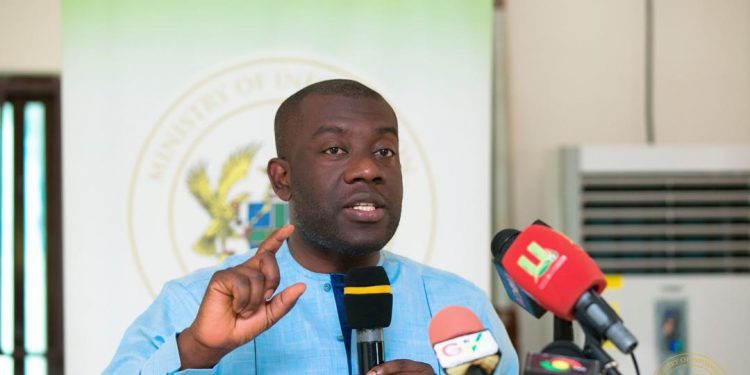Ghana’s poor ranking in the Reporters Without Borders 2022 World Press Freedom Index has been blamed to a change in methodology, according to the government.
Ghana has dropped from 30th to 60th in the world rankings, the country’s lowest in nearly two decades.
Ghana has likewise had its worst year on the African continent, falling from third to tenth place.
In a statement made on Wednesday, May 4, 2022, the Information Ministry stated that it welcomes the RSF report as a baseline reference document against which press freedom in the country can be measured in the coming years.
The government statement, on the other hand, focused largely on the methodology employed by RSF in the ranking, emphasizing that the change in methodology accounted for a significant portion of the drop.
Read Also: President Akufo-Addo honored with Africa Peace Award
It noted a number of countries’ loss in position, including the Netherlands, which fell from fifth in 2021 to 28th in 2022 in the global ranking.
“Due to this development, four (4) of the countries (Netherlands, Jamaica, Switzerland, and New Zealand) that ranked top ten (10) in 2021 significantly dropped in ranking, slumping out of the top ten (10) in the year under review.”
“It is worthy of note that Ghana’s dip in ranking was largely influenced by two of the new parameters, namely, the Economic Context and Safety of Journalists where the country scored 47.22% and 62.25% respectively.”
Concerning the protection of journalists, the government stated that non-state actors’ activities may factor into the judgment of press freedom.
“It is also striking that the new report took into consideration the effect of opinion media, propaganda, disinformation, and fake news and their adverse impact on press freedom ranking for affected countries. This is a result of growing political and social tensions leading to information distortions and the publication of false news, particularly across social media platforms,” it added.
The government also stated that it intends to implement strategic initiatives to improve Ghana’s image on the worldwide press freedom index.
In order to consistently support press freedom and the safety of journalists, the government wants to accomplish the following:
1. Work in collaboration with the National Media Commission to deepen the execution of the Coordinated Mechanisms for the safety of journalists.
2. Collaborate with stakeholders including Civil Society Organizations in deepening education for state and non-state actors on the safety of journalists
3. To address the RFS’ concern about the poor economic conditions of most journalists in the country, governed continue engagements with media associations including media owners to improve the working and economic conditions of journalists.
4. Collaborate with stakeholders in the fight against disinformation and the spread of news.
Report indices
Ghana dropped 30 places in the World Press Freedom Index for 2022.
Ghana ranked 60 in the 2022 index compiled by campaign group Reporters Without Borders (RFF), up from 30 in 2022.
This is Ghana’s lowest rating in 17 years, having previously been ranked 66th and 67th in 2005 and 2002, respectively.
According to the most recent statistics, Ghana’s indicative points fell from 78.67 percent to 67.43 percent compared to last year.
Although the country is seen as a regional leader in democratic stability, journalists have faced increasing challenges in recent years, according to the report.
“To protect their jobs and their security, they increasingly resort to self-censorship, as the government shows itself intolerant of criticism”, the report mentioned.
According to Reporters Without Borders, Ghanaian journalists’ safety has deteriorated dramatically in recent years.
For example, activists claimed that in 2020, security officers attacked reporters covering the success of anti-COVID-19 measures.
That is not the only reason. Ghanaian political officials are believed to be threatening investigative journalists with death.
“Nearly all cases of law enforcement officers attacking journalists are not pursued”, it said.
Methodology
Prior to publication, the Index provides a picture of the situation in the 180 nations and territories during the calendar year (January-December). Nonetheless, it is intended to be interpreted as a true reflection of the circumstances at the time of publication.
As a result, if a country’s press freedom situation changes substantially between the end of the year examined and publication, the data is updated to reflect the most current developments.
This could be due to a new conflict, a coup, a significant attack on journalists that is unprecedented or very exceptional, or the rapid implementation of an extreme oppressive policy.
This unusual technique was employed with Russia, Ukraine, and Mali for the 2022 Index.
The score of each country or territory is calculated using five contextual variables that describe the state of press freedom in all of its complexities: political context, legal framework, economic backdrop, sociocultural context, and safety.
The Index’s rankings are based on a number provided to each country or territory ranging from 0 to 100, with 100 being the best possible score (the highest possible level of press freedom) and 0 being the lowest.
Although Ghana is seen as a regional leader in democratic stability, journalists have faced increasing challenges in recent years, according to the research.
“To protect their jobs and their security, they increasingly resort to self-censorship, as the government shows itself intolerant of criticism”, the report mentioned.
According to the report, the safety of Ghanaian journalists has deteriorated dramatically in recent years.
“Nearly all cases of law enforcement officers attacking journalists are not pursued”, it said.
Read Full Government Statement Here
SOURCE: CITINEWSROOM



























